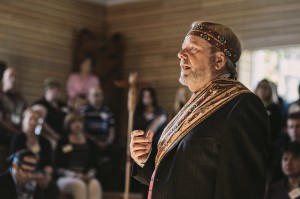- Dr. Mark Evered, UFV
During Senior Administration workshops, it was noted that Student retention was closely tied to support structures, including a culturally safe (decolonized) space, funding support, daycare support, community involvement, aboriginal advisors, elders in residence, and Indigenous faculty and programming. Elders and community members should be most welcome; and Traditional Knowledge could be passed on, with the proviso that it belonged to the community and not the institution. Culture and tradition need to be seen as a way of being, rather than a series of events: there needs to be more dialogue and action around the difference between First Nations ways of knowing versus the western way. Administrators also added that Indigenization was about having a better understanding and appreciation of Aboriginal people.
Also recommended was that universities should attend the World and National Indigenous Peoples conference and join the World Indigenous Accreditation body. At all times, Institutions need to recognize what traditional territory they are on and also understand about the issues of those that attended residential school and the residual effects that residential school still has on communities.
A research ethics committee should be established with aboriginal representation to examine and approve any indigenous research. There should be policy around how to conduct research about indigenous people and ways, which would include how the research would give back to the community.
Community consultation and creation of grass roots programming was also recommended; the values around community engagement need to be embedded throughout all policy and programming in the institution. Trust building is a very necessary part of that process, as historically there have been both good and bad experiences around institution-community engagement and collaboration.
Senior Administrators also recommended cross-cultural training for all faculty and staff; some institutions already have large indigenous libraries, workshops, and orientations for staff and faculty. Diverse perspectives, difficult topics, open and reciprocal sharing among all groups was recommended. Building alliances and networking with as many people at all levels of the institution and within the communities is a necessary part of this process. “White man’s guilt” was mentioned in the context that non-aboriginal needed to make the effort to engage and learn about aboriginal culture and worldviews nonetheless. Ignorance on the part of non-aboriginals was not considered an excuse to not engage; a willingness to work across differences is very necessary, as is the awareness that different nations have different protocols, and that it is not realistic to lump all nations into one way of doing things.
Included in the Senior Administration definition of indigenization was its meaningful, humane nature.”Limited resources can be stretched by generosity of heart. Indigenization is about being fully human. If we have love, attention and help from our neighbors, you will have generous compassion. Indigenizing the academy is an invitation for you to bring your full humanness to the academy. Learn to think with your heart.”
“It’s all about relationship building”



Ey swayel, just wondering what cross cultural training/s to date, have been offered to
Faculty and staff at UFV. When is the next cross cultural training?
Kw’etslometselcha,
Laura Wee Lay Lay Wealick.
UFV Halq’emeylem Language instructor